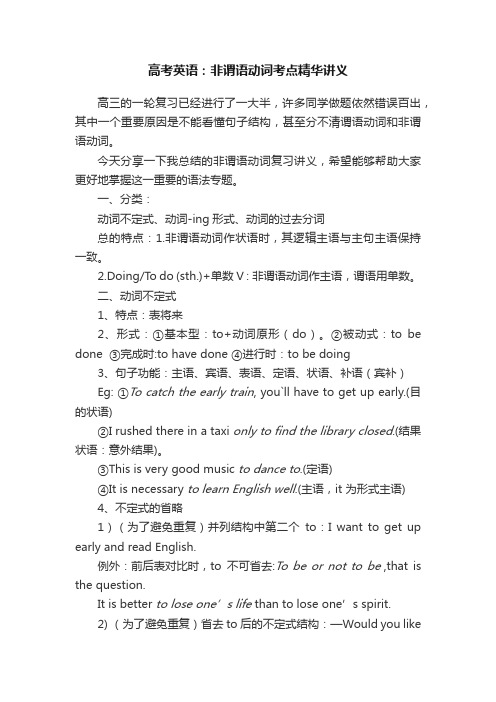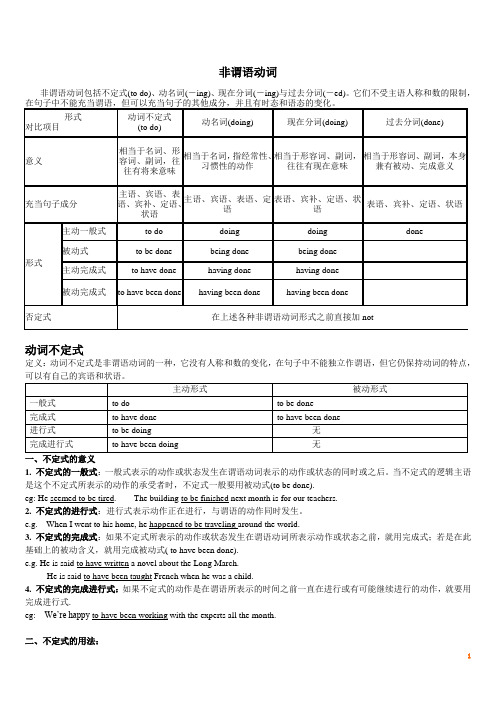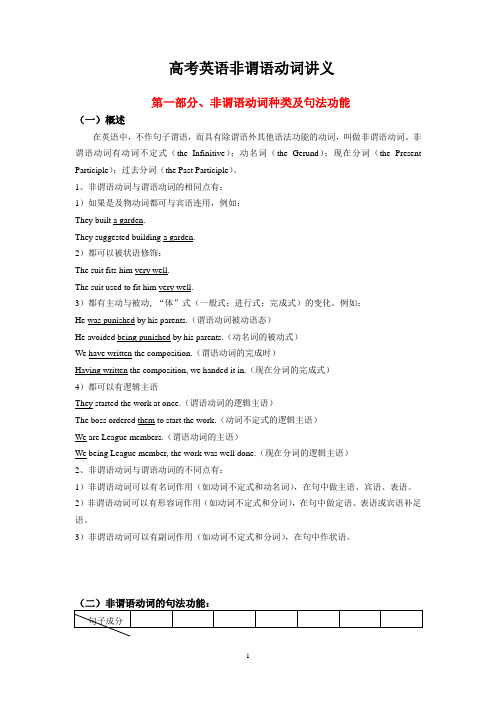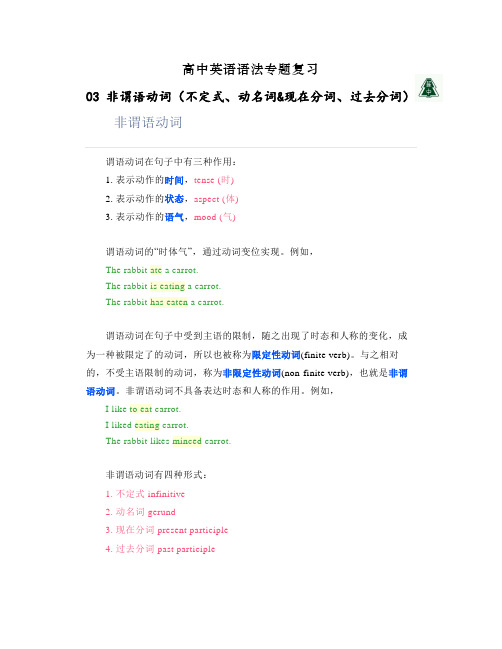高中英语语法:非谓语动词 专题讲义
第11讲 非谓语动词:动词不定式(讲义)(学生版) 2025年高考英语一轮复习讲练测(新教材新高考)

第01讲动词不定式目录01 考情透视.目标导航 (2)02 知识导图.思维引航 (3)03 考点突破.考法探究 (3)【基础详单】 (3)知识点1 不定式的概念及特点 (4)知识点2 不定式的时态和语态 (4)考点一不定式的句法功能 (4)知识点1 作主语 (4)知识点2 作宾语 (5)知识点3 作补语 (6)知识点4 作表语 (7)知识点5 作定语 (8)知识点6 作状语 (9)考点二不定式的特殊用法 (11)知识点1 疑问词+不定式 (11)知识点2 不定式的省略 (12)知识点3 不定式的主动形式表示被动含义 (12)04 真题练习·命题洞现1.真题实战 (13)2.命题演练 (14)三年真题考点分布【基础详单】知识点1 不定式的概念及特点非谓语动词指不能单独作谓语,但保留动词的某些特征的动词形式。
包括动词不定式、动名词和分词(现在分词和过去分词)三类,它们没有人称和数的变化,但根据发生的时间、状态及主被动关系有形式上的变化,还可以有自己的宾语和状语。
动词不定式的基本构成形式:“to+动词原形”。
知识点2 不定式的时态和语态考点一不定式的句法功能知识点1 作主语【名师提醒】 1.不定式作主语时,相当于名词或代词,谓语动词用单数形式。
2. “赞扬,责备”的形容词通常用of sb作逻辑主语:wrong, right, kind, nice, brave, careful, careless, greedy, honest, lazy, modest, selfish, thoughtful, impolite, polite, clever, foolish, silly, stupid, cruel, rude, generous,considerable等。
3. 以下形容词通常用for sb作逻辑主语:easy, hard, difficult, important, necessary, impossible, possible, safe, dangerous, unusual, wonderful等用for sb作逻辑主语。
高考英语:非谓语动词考点精华讲义

高考英语:非谓语动词考点精华讲义高三的一轮复习已经进行了一大半,许多同学做题依然错误百出,其中一个重要原因是不能看懂句子结构,甚至分不清谓语动词和非谓语动词。
今天分享一下我总结的非谓语动词复习讲义,希望能够帮助大家更好地掌握这一重要的语法专题。
一、分类:动词不定式、动词-ing形式、动词的过去分词总的特点:1.非谓语动词作状语时,其逻辑主语与主句主语保持一致。
2.Doing/T o do (sth.)+单数V : 非谓语动词作主语,谓语用单数。
二、动词不定式1、特点:表将来2、形式:①基本型:to+动词原形(do)。
②被动式:to be done ③完成时:to have done ④进行时:to be doing3、句子功能:主语、宾语、表语、定语、状语、补语(宾补)Eg: ①To catch the early train, you`ll have to get up early.(目的状语)②I rushed there in a taxi only to find the library closed.(结果状语:意外结果)。
③This is very good music to dance to.(定语)④It is necessary to learn English well.(主语,it 为形式主语)4、不定式的省略1)(为了避免重复)并列结构中第二个to:I want to get up early and read English.例外:前后表对比时,to不可省去:To be or not to be ,that is the question.It is better to lose one’s life than to lose one’s spirit.2) (为了避免重复)省去to后的不定式结构:—Would you liketo go shopping?—Yes,I`d like to.例外:to后有have/be时,保留be或have—Did you go shopping yesterday? —No, but I ought to have.5、不定式主动形式表被动意义1)主(sth)+ be + 主补/表语(表性质的adj. + to do)2) 主+Vt + 宾语 + 宾补(adj.+ to do)3) 主 + Vt+ 宾语+定语(to do): 不定式作定语与所修饰的名词(代词)构成逻辑动宾关系,又和该句主语构成逻辑上的主谓关系。
高中英语语法专项精讲-非谓语动词讲解

非谓语动词非谓语动词包括不定式(to do)、动名词(-ing)、现在分词(-ing)与过去分词(-ed)。
它们不受主语人称和数的限制,动词不定式定义:动词不定式是非谓语动词的一种,它没有人称和数的变化,在句子中不能独立作谓语,但它仍保持动词的特点,一、不定式的意义1. 不定式的一般式:一般式表示的动作或状态发生在谓语动词表示的动作或状态的同时或之后。
当不定式的逻辑主语是这个不定式所表示的动作的承受者时,不定式一般要用被动式(to be done).eg: He seemed to be tired. The building to be finished next month is for our teachers.2. 不定式的进行式:进行式表示动作正在进行,与谓语的动作同时发生。
e.g. When I went to his home, he happened to be traveling around the world.3. 不定式的完成式:如果不定式所表示的动作或状态发生在谓语动词所表示动作或状态之前,就用完成式;若是在此基础上的被动含义,就用完成被动式( to have been done).e.g. He is said to have written a novel about the Long March.He is said to have been taught French when he was a child.4. 不定式的完成进行式:如果不定式的动作是在谓语所表示的时间之前一直在进行或有可能继续进行的动作,就要用完成进行式.eg: We’re happy to have been working with the experts all the month.二、不定式的用法:1. 不定式做主语:不定式做主语一般表示具体的某次动作。
而动名词doing 表示习惯的,经常的动作。
非谓语动词超详细讲解ppt课件

动名词既有普通形式,也有完成形式和被动形式。完成形式表示动作已经完成, 如having read;被动形式表示动作被承受,如being written。
动名词在句子中的成分
动名词也可以作表语,用来描述 主语的内容或性质,如Her job is teaching English.
动名词还可以作定语,修饰名词, 如a reading room, a swimming pool等。
非谓语动词超详用法与功能 • 动名词的用法与功能 • 分词的用法与功能 • 独立主格结构的用法与功能 • 非谓语动词的注意事项与误区
01
非谓语动词概述
Chapter
定义与作用
定义
非谓语动词是指在句子中不充当谓 语的动词,包括不定式、动名词和 分词三种形式。
独立主格结构的时态和语态
时态
独立主格结构的时态主要根据句子中的谓语动词来确定。如果谓语动词是现在时或将来 时,独立主格结构用现在分词;如果谓语动词是过去时,独立主格结构用过去分词。
语态
独立主格结构的语态分为主动语态和被动语态。当独立主格结构的逻辑主语与非谓语动 词之间是主动关系时,用主动语态;当逻辑主语与非谓语动词之间是被动关系时,用被 动语态。例如:“The problem being settled, we all felt relieved.”(问题解决了,
我们都感到松了一口气。)
06
非谓语动词的注意事项与误区
Chapter
非谓语动词使用时需要注意的问题
动词不定式、动名词和分词的区别
01
在使用非谓语动词时,需要根据语境和表达的逻辑关系选择适
当的非谓语动词形式。
时态和语态的正确使用
02
高中英语非谓语动词课件(70张)

主语
宾语 表语
定语 状语
I warned the patient not to eat cold water
after the operation.
宾补
(1)作主语 不定式做主语时, 可以直接放在谓语动词之前。
To see is to believe.
Subject+ find/think/feel/make/ consider… it +adj/n + to do sth.
1.We thought ___ better ___ start early. 2.Do you consider ___ better not __ go? 3. I feel __ my duty __ change all that. 4.We think __ important __ obey the law. 5.I know __ impossible __ finish so much homework in a day.
句型3: It is adj. for/of sb. to do sth.
It is + adj + for sb to do sth (是形容事物的性质的 ) It is + adj + of sb to do sth (是形容人的品质的 )
It is easy for me to finish this work before ten. It is a great honor for us to be present at your birthday party.
make let have
do + sb. + doing
高中英语语法非谓语动词详细讲解课件

Getting up early is good habit.
To get up early this morning made me sleepy.
②动名词短语作主语时,常将一些较长的动名词短语置于句尾, 而用it 作形式主语,常用句型有:
no use/good uesful/useless It is/was+ of little use/good +doing sth. a waste of time worth It's no use crying over spilt milk. 覆水难收。 It's waste of time arguing with such a person. It's worth making an appointment before you go.
4. 动名词作定语
动名词作定语的情况并不普遍,一般只限于单个的动名词作名词
的定语,表示所修饰名词的用途或功能,在意义上相当于“名词
+for+ doing”。
swimming pool 游泳池
reading material 阅读材料
walking stick 手杖
opening speech 开幕词
2. 动名词作宾语
非谓语动词语法讲解课件

03
动名词
动名词的定义
总结词
动名词是一种非谓语动词形式, 表示动作或行为的名词化表达。
详细描述
动名词在英语语法中,是将动词 转化为名词的一种形式,通常在 句子中充当名词的成分,表示某 个动作或行为。
动名词的形式
总结词
动名词有一般式、完成式和被动式三 种形式。
详细描述
动名词的一般式通常是在动词后加-ing ,表示动作正在进行或发生的状态;完 成式是在动词后加-ing并加上-ed,表 示动作已经完成;被动式是在动词后加 -ed,表示动作是被执行的状态。
详细描述
非谓语动词可以作为句子的主语、宾语、表 语、定语或状语等成分,使句子更加丰富和 多样化。通过使用非谓语动词,可以更准确 地表达动作的进行状态、被动关系以及名词 化的动作,使句子更加简洁明了。同时,非 谓语动词还可以用于表达虚拟语气、强调句 型等复杂句型,使英语表达更加丰富和有力
。
02
动词不定式
动词不定式的定义
总结词
动词不定式是非谓语动词的一种形式,由“to + 动词原形”构成,表示将来、可 能或意向的动作。
详细描述
动词不定式是非谓语动词的一种形式,它由“to + 动词原形”构成,表示将来、 可能或意向的动作,而不表示时态。与谓语动词相比,非谓语动词没有时态和语 态的变化。
Байду номын сангаас
动词不定式的形式
总结词
动词不定式有四种形式,分别为一般式、进行式、完成式和完成进行式。
详细描述
动词不定式有四种形式。一般式为“to + 动词原形”,表示将来或可能的动作;进行式为“to be + 现在分词” ,表示正在进行的动作;完成式为“to have + 过去分词”,表示已经完成的动作;完成进行式为“to have been + 现在分词”,表示已经完成的进行动作。
非谓语动词讲解高中

非谓语动词讲解高中非谓语动词是指在句子中作动词的用法,而不是表示谓语动作或状态的主要成分。
非谓语动词包括动词不定式、动名词和分词。
在高中英语中,非谓语动词经常用于句子的修饰、独立主语和补语等的结构。
下面将对非谓语动词进行详细的讲解和提供相关的参考内容。
一、动词不定式(infinitive)动词不定式是动词的一种非谓语形式,常用于句子中作主语、表语、宾语、状语和补足语等。
动词不定式的基本形式是“to+ 动词原形”,它具有名词、形容词和副词的特点。
1. 作主语- It's difficult to learn a new language.(学习一门新语言是困难的。
)2. 作宾语- I want to go to the movies.(我想去看电影。
)3. 作表语- Her dream is to become a doctor.(她的梦想是成为一名医生。
)4. 作状语- She studies hard to improve her grades.(她努力学习以提高自己的成绩。
)5. 作补语- He made me laugh.(他让我笑了。
)二、动名词(gerund)动名词是动词的一种非谓语形式,常用于句子中作主语、宾语、表语和状语等。
动名词的基本形式是动词+ing形式,它具有名词的特点,可以在句子中起到名词的作用。
1. 作主语- Swimming is good exercise.(游泳是很好的运动。
)2. 作宾语- I enjoy reading novels.(我喜欢读小说。
)3. 作表语- His favorite activity is playing basketball.(他最喜欢的活动是打篮球。
)4. 作状语- She learned English by watching American movies.(她通过看美国电影学习英语。
)三、分词(participle)分词是动词的一种非谓语形式,常用于句子中作定语、状语和表语等。
非谓语动词考点精讲精练(含答案) 讲义--2023届高考英语一轮复习

胆置黑词考,牖讲含蜜g)讲义非谓语动词是高考语法填空和短文改错必考热点语法工程之一。
现结合典型考题对非谓语动词的考点进行梳理和总结,帮助大家明确考点,找出解题规律和方法。
一、考查非谓语动词作主语能作主语的非谓语动词有不定式和动名词。
两者的区别是:表示某一具体的动作时、多用不定式;表示比拟抽象的一般的行为倾向时,多用动名词。
当动名词或不定式短语较长时,常用it作形式主语放在句首而把动名词或不定式短语放于句末。
(典例】(ignore) the difference between the two research findings will be one of the worst mistakes you make.解析:Ignoring。
分析句子结构可知,本句的谓语动词是will be,因此前面局部是主语,应该使用动名词短语作主语。
二、考查非谓语动词作宾语不定式和动名词都可作动词或介词的宾语。
有些动词后只跟不定式作宾语,如want, wish, hope, manage, demand, promise, refuse, pretend, plan, offer, decide, agree, expect等。
有些动词后只跟动名词作宾语,如admit, appreciate, avoid, consider, delay, dislike, enjoy, escape, excuse, finish, forgive, imagine, keep, mind, miss, practice, resist, risk, suggest, deny, stand 等。
有些动词或动词短语后既可以跟不定式,又可以跟动名词作宾语,如forget, remember, regret, mean, try, go on等,但意义上有区别。
[典例1 ] I showed them I was independent by wear strange clothes.解析:wear改为wearing”介词by后应接动名词作宾语。
高考英语专题《非谓语动词讲解》 (全面详细)精品课件

2. Our work is serving the people. 表语
3. I remember being taken to Wuhan when I was a very small child. 宾语
4. We have a swimming poor in the back
yard.
定语
11
动名词与不定式作主语,表语的区别 动名词作主语时往往表示一般性的、习惯性的动 作;而不定式作主语则表示在具体情况下特定的 或一次性的动作。但有时可以通用。
12
只能用动名词作宾语的动词
1.advise, allow, avoid, admit, consider, delay, enjoy, escape, excuse, finish, imagine, mind, miss, permit, practise, risk, suggest, appreciate
主动(vt.) 被动(vt.) 主动(vi.) 被动(vi.)
一般式 to do to be done to do
/
进行式 to be
/
to be
/
doing
doing
完成式 to have to have to have
/
done been do式是指带 to 的动词原形( 使用中有时不带 to ) (一) 作主语 To see is to believe. To see you is glad.=It is glad to see you. (二)作宾语 I want to see you. (三)作表语 My hope is to see you.
9
动名词(主、宾、定、表)
主动 被 动 主动 被 动
高考英语非谓语动词精品讲义

高考英语非谓语动词讲义第一部分、非谓语动词种类及句法功能(一)概述在英语中,不作句子谓语,而具有除谓语外其他语法功能的动词,叫做非谓语动词。
非谓语动词有动词不定式(the Infinitive);动名词(the Gerund);现在分词(the Present Participle);过去分词(the Past Participle)。
1、非谓语动词与谓语动词的相同点有:1)如果是及物动词都可与宾语连用,例如:They built a garden.They suggested building a garden.2)都可以被状语修饰:The suit fits him very well.The suit used to fit him very well.3)都有主动与被动, “体”式(一般式;进行式;完成式)的变化。
例如:He was punished by his parents.(谓语动词被动语态)He avoided being punished by his parents.(动名词的被动式)We have written the composition.(谓语动词的完成时)Having written the composition, we handed it in.(现在分词的完成式)4)都可以有逻辑主语They started the work at once.(谓语动词的逻辑主语)The boss ordered them to start the work.(动词不定式的逻辑主语)We are League members.(谓语动词的主语)We being League member, the work was well done.(现在分词的逻辑主语)2、非谓语动词与谓语动词的不同点有:1)非谓语动词可以有名词作用(如动词不定式和动名词),在句中做主语、宾语、表语。
2)非谓语动词可以有形容词作用(如动词不定式和分词),在句中做定语、表语或宾语补足语。
高考英语语法专题复习:非谓语动词讲义(不定式、动名词

高中英语语法专题复习03 非谓语动词(不定式、动名词&现在分词、过去分词)非谓语动词谓语动词在句子中有三种作用:1. 表示动作的时间,tense (时)2. 表示动作的状态,aspect (体)3. 表示动作的语气,mood (气)谓语动词的“时体气”,通过动词变位实现。
例如,The rabbit ate a carrot.The rabbit is eating a carrot.The rabbit has eaten a carrot.谓语动词在句子中受到主语的限制,随之出现了时态和人称的变化,成为一种被限定了的动词,所以也被称为限定性动词(finite verb)。
与之相对的,不受主语限制的动词,称为非限定性动词(non-finite verb),也就是非谓语动词。
非谓语动词不具备表达时态和人称的作用。
例如,I like to eat carrot.I liked eating carrot.The rabbit likes minced carrot.非谓语动词有四种形式:1. 不定式 infinitive2. 动名词 gerund3. 现在分词 present participle4. 过去分词 past participle谓语动词是简单句的核心动词,非谓语动词只可能出现在其他的句子成分中。
1. 主语例:Swimming makes us hale and hearty.2. 宾语例:Janet suddenly stopped talking.3. 表语/主语补语例:Her wish is to become a doctor in the future.4. 宾语补语例:I invited him to come here.5. 定语例:Don't disturb the sleeping dog.6. 状语例:He went to the supermarket to buy a pen.不定式、动名词句子的核心动词只能由谓语动词充当,而非谓语动词可以充当句子的其他成分。
非谓语动词讲义

非谓语动词一.非谓语动词:动词的某种特殊形式,在句子中做除谓语外的其他成分。
分类:动词不定式,动名词,现在分词,过去分词。
二.动词不定式:构成:to do。
否定形式:not to do .发生。
eg: I plan to live a busy life in high school.She seems to be unhappy.The computer needs to be repaired.完成式:不定式的动作发生在谓语动词的动作之前。
eg: I am sorry to have kept you waiting so long.The house seems to have been broken into.进行式:不定式的动作与谓语动词的动作同时发生。
eg: She pretended to be reading when her mother came in.He happened to be searching my bag when I came in.2.句法功能:(1)做主语:To see is to believe. 眼见为实/百闻不如一见。
It is adj for/of sb to do sth. 对某人来说,做某事是It is impossible for me to live alone in Beijing.It is not easy to find your way around the town.(2)做宾语:afford, agree, aim, bear, begin, bother, care, choose, continue, decide, demand, desire, determine, expect, fail, forget, hate, help, hope, intend, learn, manage, mean, need, offer, plan, pretend, refuse, remember, want, wish, promise, happeneg: She has determined to be a leader.注: 如果不定式做宾语,且后面有宾补时,把不定式后置,用it来做形式宾语。
高中英语非谓语动词讲解(共61张PPT)

物动词的话,后应跟着一个相应的介词,但如果被修饰的是 place、time、way 就除外。 如:We must rent a house to live in.
That is a very good place to live.
在学习动词不定式的时候还有两点要注意哦!
1、“一感二听三让四看见”,要用省to的不定 式作宾补,但变为被动句时,要加上to, 如
e.g. 1)We hear him sing in the next room. He is heard to sing in the next room.
(feel, hear, listen to, see, watch, notice , look at, have , make, let)
What ∕ How about doing 做某事怎么样?
此tto doing sth.(盼望) pay attention to doing sth.(注意) be used to doing sth. (习惯于) prefer doing sth to doing sth (宁愿做某事而不愿做某事 ) devote to doing sth (致力于)
牛刀小试
1. My mother often asks me __D___ some cleaning on Sundays
区分下列词组:
see sb. doing/ do sth. hear sb. doing/ do sth. watch sb. doing/ do sth. notice sb. doing/ do sth.
感官动词 see, watch, look at, notice, hear, listen to, feel
高中英语非谓语动词语法讲解(共60张PPT)

The platform which has been built will be used
语
to perform on. √
❖ 2. Having given her opinion about the building,
she left the meeting.
作
Having been used for a long time, the computer 状
(3)下列动词接不定式与接~ing形式意义相近:
❖ like,love, hate, dislike, begin, start, prefer, continue, intend,attempt等.
e.g:I prefer making (to make) an outline before I do my oral
Written in simple English, the book is easy to read
❖ 2. Being used by me now,the bike can’t be lent to you.
❖ 3. Having been used for many years, the bike needs repairing.
I prefer to stay at home today.(具体某次行为) He prefers walking to cycling.(惯常行为)
*一般说来不能用于进行时的动词如:realize, know,understand,see,lose等,多用不定式 如:I began to realize I had been wrong.
❖ 2.Japan is a developed country =a country which has developed.
- 1、下载文档前请自行甄别文档内容的完整性,平台不提供额外的编辑、内容补充、找答案等附加服务。
- 2、"仅部分预览"的文档,不可在线预览部分如存在完整性等问题,可反馈申请退款(可完整预览的文档不适用该条件!)。
- 3、如文档侵犯您的权益,请联系客服反馈,我们会尽快为您处理(人工客服工作时间:9:00-18:30)。
高中英语语法:非谓语动词专题讲义
非谓语动词就是不能充当句子谓语成分的动词形式,包括动词不定式(to do)、分词(过去分词V-p.p.、现在分词V-ing)、动名词V-ing三种形式。
一、动词不定式
1、基本形式:to do (有时to可以省略,称为不带to的不定式)
2、特点:没有人称和数的变化,也不受谓语动词时态变化的干
扰eg: I(You/He/She/We/You/They) want(wants/wanted)
to buy a car.
3、动词不定式可充当的句子成分
作主语
eg: To study hard is our duty.
常使用it作为形式主语,不定式作真正主语放后面
It is not easy to master a foreign language.
亦可在不定式前面加上for sb.指出不定式的逻辑主语
It is not easy for us to master a foreign language.
但某些表示人的品行的形容词,如:
kind/good/nice/right/wrong/wise/unwise/polite/impolite/rude/silly
/stupid/foolish /careless/clever/thoughtful等作表语时改用of sb.
It is kind of you to help me with my study.
●作宾语
eg: I want to borrow your dictionary.
能直接跟不定式作宾语的动词有want/like/hope/wish/prefer/hate/decide/expect/desire/try/manage/ start/begin/remember/forget/ask/offer/continue/agree/choose/pro-mise/mean/pretend等
常使用it作为形式宾语,不定式作真正主语放后面
I find it interesting to study English.
●作表语
也就是放在连系动词(主要有be动词am/ is/ are、感官动词look/ hear/ smell/ taste/ feel、表示保持和变化的动词stay/ keep/ remain/ become/ turn/ grow/ get以及seem等)的后面。
eg: Her wish is to become a doctor.
She doesn’t seem to like the idea.
●作定语
eg: Here are some books (for you to read).
She has a sick baby (to take care of).
Have you got anything to say? Vt.或短语动词(Vi.+介词)The nurse has five children to look after.
She was the first person to think of the idea.
作状语
1.作目的状语
eg: To catch the first bus, I have to get up early.
He went home to see his parents.
She uses a computer to write an article.
另外不定式作目的状语常用so as to(只能放句中) / in order to She checked the names carefully so as to / in order to avoid mistakes.
In order to(不能用so as to ) arrive before dark, we started early.
2.作结果状语
eg: What have I said to make you unhappy?
另外不定式作结果状语常用以下结构:
so + adj. + as to / such ( + n. ) + as to
He is so angry as to be unable to speak.
We are not such fools as to believe him.
Her illness is not such as to cause anxiety.
她的病还没有严重到令人担忧的地步。
… enough (for sb.) to …
The ice is thick enough to walk on.
too …to …表示否定的结果
He is too young to join the army.
only to …表示出乎意料的结果
I went to see him only to find him out.
3.作原因状语
eg: I am glad to hear the news.
作插入语
不定式有时可看作插入语,用来说明说话人的态度,对整个句子进行说明。
eg: To tell you the truth(说实话), I forgot all about it.
To be frank(坦率地说), I didn’t agree with you.
●作宾语补足语
不定式作宾语补足语与前面的名词或代词构成不定式的复合结构。
eg: Mother told me to come back before 10 o’clock.
We adviced him to have a good rest.
4、动词不定式的否定式:在不定式符号to前加not
eg: He decided not to go home.
5、“疑问词+不定式”结构
疑问词who/which/what/when/where/how/whether等后接不
定式短语,在句中作主语、宾语、表语等。
eg: I don’t know what to do.
6、动词不定式省略to的几种情况
●在使役动词make/ let/ have及感官动词see/ watch/ look at/ hear/
listen to/ feel/ notice等后面,但在被动语态中to 要恢复。
eg: The teacher make the students listen attentively.
The students are made to listen attentively.
●but/ except/ besides/ than/ about等前面有do的某种形式存在。
